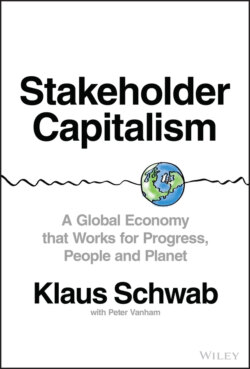Stakeholder Capitalism

Реклама. ООО «ЛитРес», ИНН: 7719571260.
Оглавление
Klaus Schwab. Stakeholder Capitalism
Table of Contents
List of Illustrations
Guide
Pages
STAKEHOLDER CAPITALISM. A GLOBAL ECONOMY THAT WORKS FOR PROGRESS, PEOPLE AND PLANET
About the Authors
Preface
1 75 Years of Global Growth and Development
Foundations of the Post-War Global Economic Order
The Glorious Thirty Years in the West
The Tumultuous 1970s and 1980s
Die Wende
Globalization in the 1990s and 2000s
The Collapse of a System
Notes
2 Kuznets’ Curse : The Issues of the World Economy Today
The Original Kuznets’ Curse: GDP as Measure of Progress
Low GDP Growth
Rising Debt
Low-Interest Rates and Low Inflation
Declining Productivity Growth
The Second Kuznets’ Curse: Inequality
Income Inequality
Wealth, Health, and Social Mobility
The Third Kuznets Curse: The Environment
A Degrading Environment
Notes
3 The Rise of Asia
China's Special Economic Zones
The Price of Progress
Emerging Markets in China's Slipstream
Growth in India
The Bigger Picture
Notes
4 Divided Societies
German Division and Reunification
The Erosion of the Political Center
Societal Unrest
The Lesson to Draw from a Divided Society
Notes
5 Globalization
Indonesia and Globalization
Early Beginnings and Spice Routes6
Age of Discovery (15th to 18th Century)
First Wave of Globalization (19th Century–1914)
Second and Third Wave of Globalization
Globalization 4.0
Globalization Today
Notes
6 Technology. A Changing Labor Market
A Changing Business Landscape
Pre-Industrial Revolutions
The First Industrial Revolution
The Second Industrial Revolution
The Third Industrial Revolution
The Fourth Industrial Revolution
Notes
7 People and the Planet
Thunberg at Davos
Notes
8 Concept
The History of the Stakeholder Concept
The Stakeholder Model Today
Principles and Beliefs Underlying the Stakeholder Model
Subsidiarity
Value Creation and Sharing
Stakeholder Capitalism in Practice. A Seat at the Table
Going Beyond GDP and Profits
Check and Balances, and Robust Institutions
Notes
9 Companies
Mærsk
Notes
10 Communities. New Zealand during the COVID-19 Crisis
The Key Tasks of National Governments
Singapore as a Model of Stakeholder Government
New Zealand and the Move Away from GDP
Civil Society and the International Community
Consumer Rights Groups
Modern Unions
Advocacy Groups
Notes
Conclusion: The Road to Stakeholder Capitalism
Notes
Acknowledgments
Index
WILEY END USER LICENSE AGREEMENT
Отрывок из книги
“Fifty years ago Klaus Schwab first proposed his theory that businesses are not only responsible to their shareholders, but also to all their stakeholders. With a global economic system generating deep divisions and inequalities, Klaus renews his call for a form of capitalism that works for everyone and where businesses don't just take from society but truly give back and have a positive impact. Stakeholder Capitalism is an urgent call to action.”
.....
Finally, more and more people are questioning even how useful it is to pursue growth as an indicator of progress. According to the Global Footprint Network,27 1969 was the last time the global economy didn't “overspend” nature's resources for the planet. Fifty years on, our ecological footprint is greater than ever, as we use up more than 1.75 times the resources the world can replenish.
All these macroeconomic, social, and environmental trends are mirrored in the incremental effects of decisions taken by individuals, companies, and governments, both local and national. And it confronts those same societies, which have come so far from the era of wars, poverty, and destruction, with an unpleasant new reality: they grew rich but at the expense of inequality and unsustainability.
.....